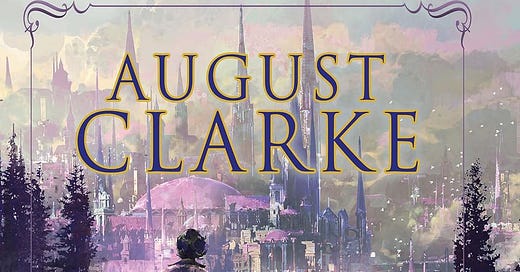This book is written in the sickly sweet juices of a fruit that just turned, is still turning on your tongue. It will poison your guts as it fills your mouth and cascades down your face and throat to fill your chest with love and loss and grief and glory. It will make you yearn for another bite of the world August Clarke has created.
My time with Metal from Heaven was beautiful and raw. This dystopian, sapphic fever dream shows a world bled at the alter of ichorite production, a miracle metal that weaves its way into everything from the bullets used to break a worker strike to the impossibly tight dresses worn by robber barons and princesses. The text is hallucinatory at times, it has this glistening, sparkling unreality that is simultaneously poetic and disorienting, and especially as the narrator descends into one of their fits from touching ichorite.
“When few rule the many, they must use force to take what they want, and demonstrate force not just to keep it, but to snuff the fires of contradiction from the collective. People above must do this. This is a quality of being above. Someone must be below, and to be below is to be bereft and suffer. “The scripts of history show the above how to remake what’s been made, and the way to do that’s violence.”
The anti-capitalist themes are familiar, but Clarke has woven them into a rich, fully imagined world. Everything the story touches turns slowly to gold. As the story digs in, we’re given beautiful religious depth, a world history, the changing tides of economic policy and politics on a global scale. It’s masterfully done, interwoven throughout without feeling distracting.
“Hereafterists are champions of faith in all. We know that this evil is a machine made of history, it is created, it can be dismantled. We can try something else. We can make a way to be together without being above each other. Everyone can use everything. No one can keep the devices used to make the world to themselves. No borders, no punishment for movement. No wage clock, no work as a method for managing the masses ’til they’re too exhausted to rise up and kill you. No enforcers.”
This is a book that has something to say, or several things really, and it’s unafraid to do it. It’s a middle finger, a punch to the nose, and an unexpected kiss on the mouth. It’s an ode to anarchy and that ethos that fueled all the young punks I’ve ever known. I cannot say enough about how achingly poetic it’s written. At times, it was too slow for me. At times, it was incoherent and lacked precision and economy of language. These are small harangues. It wasn’t perfect, but I wouldn’t hesitate to recommend it widely. I want to hug August Clarke for what they’ve created here.
“I’ll renounce nothing. I’ll bear the torch of a better tomorrow until I die. Unalone toward dawn we go.”



